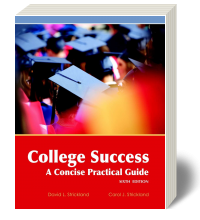

College Success: A Concise Practical Guide
Sixth Edition Strickland, © 2015, 323 pages
College Success: A Concise Practical Guide is primarily designed for a full-semester course, but can also be used effectively as part of an orientation program or even by the individual student. The text is accompanied by a test bank and instructor's manual, PowerPoint slides, and online student resources including practice quizzes and flashcards.
Request Examination CopyPopular Formats (with student pricing)
Traditional Print
Our traditional print version of this textbook is available in the following formats:
- Loose-leaf textbook ($49)
- TEXTBOOKplus [Loose Leaf / online eBook / downloadable eBook / Lab] ($60)
- Soft cover, perfect bound ($162)
See Prices and ISBNs for bookstore pricing.
Prices and ISBNs
This title is available in the following formats.
|
Product
Description ISBN |
Description | ISBN | Bookstore (Net Price) |
Student (Retail Price) |
|
Loose Leaf
Unbound textbook 978-1-62751-358-6 |
Unbound textbook | 978-1-62751-358-6 (9781627513586) | $36 | $49 |
|
TEXTBOOKPlus
Loose Leaf + eBook 978-1-62751-362-3 |
Loose Leaf + eBook | 978-1-62751-362-3 (9781627513623) | $43 | $60 |
|
Soft Cover
Bound textbook 978-1-62751-359-3 |
Bound textbook | 978-1-62751-359-3 (9781627513593) | $118 | $162 |
Supplements
The available Supplements are listed below:
Click here to access ancillaries save_altInstant Access (and Coupons)
All students can have free Instant Access to an eBook for the first two weeks of class while they procure their textbook. They will also receive a 10%-off coupon valid at the BVT web store for the best possible price. Get instant access codes here.
Instructor Manual
The Instructor's Manual consists of lecture and discussion topics, chapter outlines, learning objectives and class activities to better assist you with your teaching curriculum.Test Bank
Use our online course management software to create randomly-generated tests which can be downloaded directly into your course management software, such as Blackboard, Web CT, Desire 2 Learn, and E Learning.PowerPoint Slides
These PowerPoint™ slides are used to visually emphasize key points throughout the chapters.Supplemental Chapters
Two additional chapters are available for this textbook. These can be added to the text for your campus, or substituted for existing chapters.Chapter 11 - Managing Money in College and in the Future: Cashing in on the College Experience
Chapter 12 - Maintaining Physical Balance: “An Apple a Day”
We also offer an alternate version of Chapter 9.
Chapter 9 - Psychological Balance During Your College Years: Walking the Tightrope
Test Bank (Blackboard)
The Test Bank contains multiple choice and true/false questions. This file is an archive of per-chapter zipped Blackboard pool files.Excerpts
The available Excerpts are listed below:
Description
College Success: A Concise Practical Guide, by Strickland and Strickland, has helped more than 10,000 students make the transition from high school to college. This sixth edition text has been perfected over almost a decade with excellent results. It is primarily designed for a full-semester course, but can also be used effectively as part of an orientation program, or even by the individual student. With its student-friendly format and learner-centered approach, College Success captures the interest of students and keeps them engaged throughout the semester. The text is accompanied by a test bank and instructor's manual, PowerPoint slides, and online student resources including practice quizzes and flashcards.
Brief Table of Contents:
- Adjusting to College: We're Not in High School Anymore!
- Organizing: Plan Your Work and Then Work Your Plan
- Listening and Taking Notes: Do You Hear What I Hear?
- Reading: What They Never Taught You in Kindergarten!
- Focus on Learning: Why Am I Really in College?
- Learning Styles: How Do I Learn Best?
- Writing College Papers: I Have a Paper Due!
- Connecting to Resources: People, Places, and Things
- Balancing College Life: Walking the Tightrope
- Planning for the Future: What Courses Should I Take?
Each chapter begins with a chapter roadmap (including a brief chapter summary, chapter learning goals, and a study checklist) and a critical thinking activity. Reading comprehension questions are embedded throughout each chapter. These are specifically designed to help students assess and improve their knowledge, literal comprehension, inferential comprehension, and analytic skills. Links to online resources that complement the chapter are also provided. Each chapter concludes with study guide pages, learning activities and practical assignments, which provide valuable experiences and enrichment for students.
The underlying educational goals aim to help students:
- Make the all-important transition to a university culture of scholarship
- Adopt the role of life-long scholar as their predominant identity
- Take responsibility for their own learning outcomes
- Develop high-level skills in comprehension and analysis
- Learn how to create effective study materials from stated learning objectives
- Develop the habit of properly preparing for class
- Become comfortable and effective interacting in a higher-education setting
- Develop critical thinking skills beyond the high school level
This text can be easily customized by:
- Adding, deleting or rearranging sections or chapters
- Editing any of the text or illustrations throughout the textbook - down to the word level
- Creating additional assignments or in-class exercises
- Creating additional lab content or student resources
- Adding campus-specific calendars, maps, directories, resource lists, etc.
David Strickland, MA, is director of the Student Success Program and an associate professor of sociology at East Georgia State College (EGSC). In addition to writing, he has taught college courses for more than nineteen years, and has been involved in student success for more than a decade. Strickland credits some of his insights into college success to the fact that he - like a large number of his students - was a first-generation college graduate.
Carol Strickland, PhD, RN, served for 23 years as a nursing educator, most recently as an associate professor of nursing and director of nursing research at the Georgia Southern University School of Nursing. Prior to that, she was an assistant professor of nursing and an instructor of the first-year experience course at the University of Rochester.